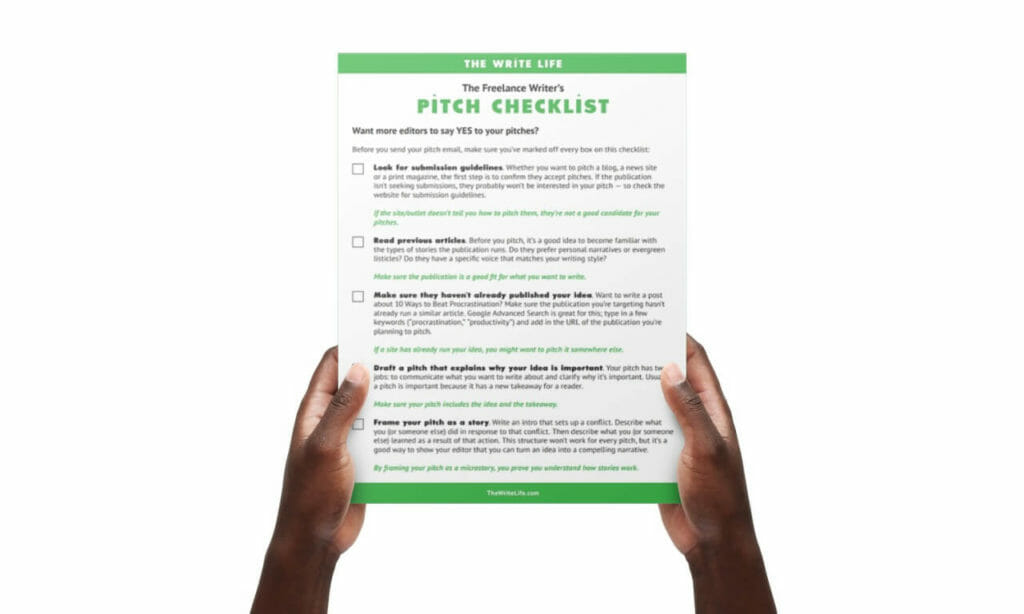How do you pitch a story based on a current event?
Pitches tied to news cycles need extra consideration before you send them off; you not only have to prove you can write the story, but also that you can write it before it loses relevance.
Let’s look at a pitch based on recent political news and see if we can get it nominated for publication.
Danielle Corcione’s current-events pitch
Danielle Corcione is both a copywriter and a freelance writer, and their work has been published in Femsplain, The Establishment, The Write Life, and many other publications you might recognize. I accepted two pitches Corcione sent to The Billfold, so I know they know how to send successful pitches.
But not all pitches land. Corcione sent the following pitch out eleven different times. Sometimes the pitch got rejected, other times it was simply ignored. Take a look at their pitch and see if you can tell why an editor might not immediately respond.
Hi [editor],
My name is Danielle Corcione. My work has recently appeared on Upworthy, the Establishment, Motherboard, and more. I’ve been following [publication’s] coverage of House of Cards, and [publication story] inspired me to apply current politics with the show.
Since Obama announced his support for Merrick Garland, I’ve wondered, “How does Merrick Garland compare to Heather Dunbar?” In House of Cards, Dunbar was a potential SCOTUS nominee. Although they’re both from a Democratic background with twenty years of judicial experience, their socioeconomic upbringings vary. For instance, the Dunbar family owns their own automobile industry while Garland’s mother ran a small business out of his childhood home. I want to further explore their political differences and similarities, in addition to the pros and cons of each nominee.
Is this fit for the ____ section? I wrote a fairly similar essay for Femsplain where I used 30 Rock to discuss conservative climate in the Midwest.
Thanks for your time and consideration.
Pitch Fix: If you’ve got a topical story, pitch it to an editor you know
Corcione’s idea is great. As a reader, I’d immediately click on a piece comparing Merrick Garland to House of Cards’ Heather Dunbar.
As an editor, however, I see two big problems with this pitch.
First, Corcione hasn’t fully researched the story. Corcione lists two similarities and one difference between Garland and Dunbar, then states “I want to further explore their political differences and similarities, in addition to the pros and cons of each nominee.”
Corcione is pitching this story without knowing what the political differences and similarities are, and without explaining what the audience will learn from reading the piece.
If this pitch came from a trusted writer I’d worked with for a few months, I might say “OK, start digging and see if you find anything interesting.” But if I hadn’t worked with Corcione before, I wouldn’t know if they would be able to find anything interesting or present it in an interesting way.
This is a fantastic example of pitching a topic instead of a story — which I listed as one of 10 mistakes that will ruin your freelance career. If Corcione had already done the research and pitched a fully-formed story instead of a topic idea, I would be much more interested in the pitch.
The other big problem with Corcione’s pitch is that it’s extremely topical. This is the kind of piece you want to run within 24 hours of Obama’s nominee announcement, otherwise it’ll look like your publication is late to the game.
There’s a little wiggle room here: An editor could accept the piece and hold on running it until the next big development in Garland’s nomination, but it would need a re-edit so it felt fresh and timely, and incorporated the latest news.
Here’s how I’d fix the pitch. First, I wouldn’t submit it eleven times. (I hope none of those were simultaneous submissions.) I’d pick an editor I knew relatively well, and pitch it based on our previous relationship. In this case, I’m going to rewrite the pitch as if Corcione were pitching me at The Billfold:
Hi Nicole,
Would you be interested in a Billfold post comparing Obama’s SCOTUS nominee Merrick Garland with House of Cards’ potential SCOTUS nominee Heather Dunbar?
Although they’re both from a Democratic background with twenty years of judicial experience, their socioeconomic upbringings vary. For instance, the Dunbar family owns their own automobile industry while Garland’s father ran a small advertising business out of his childhood home. I’d focus the piece on the way money helped both Garland and Dunbar achieve political success — Garland’s Harvard scholarship, Dunbar’s ability to campaign without Super PAC funding — even though they’re working at two different socioeconomic scales.
What do you think? I know this is a pretty topical piece, so I could get you a draft tomorrow.
Thanks,
Danielle
This pitch includes the story Corcione plans to tell: whether from humble or wealthy beginnings, money helps you achieve political success. It’s directly tailored to The Billfold, and it also addresses the topical issue by promising me a draft tomorrow if I said yes — and I probably would.
Danielle Corcione’s response
I asked Corcione how they felt about the Pitch Fix, and this was their response:
This is solid advice! I was worried how outdated the pitch might be, but you found a way to incorporate it into a previous publication I’ve been published in. In hindsight, I shouldn’t have sent this pitch out to so many people. However, I will take into account more research. That’s definitely something to make it stronger and more worthwhile to cover.
How do you pitch stories based on breaking news? Do you have additional advice for Corcione?








